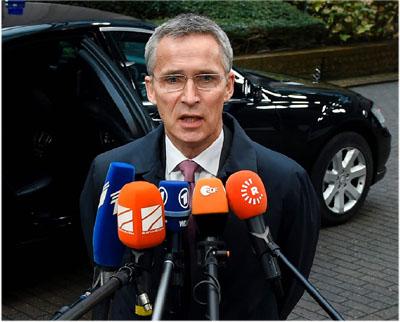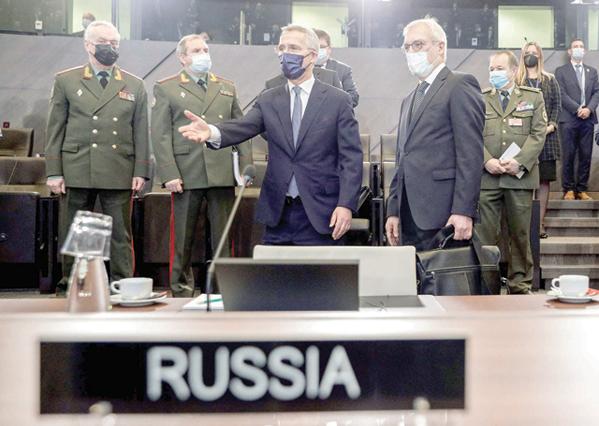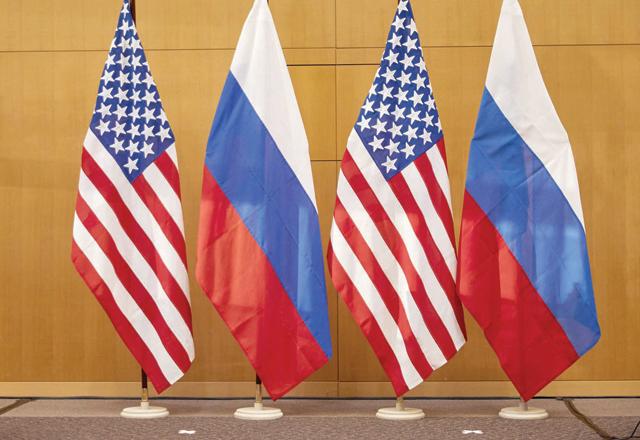You are here
NATO-Russia talks end in 'profound disagreements'
By AFP - Apr 20,2016 - Last updated at Apr 20,2016
BRUSSELS — NATO and Russia ran up against "profound disagreements" over Ukraine and other issues as their ambassadors met on Wednesday for the first time since 2014, alliance chief Jens Stoltenberg said.
The two sides agreed to keep communicating following the meeting of the NATO-Russia Council, which has been on ice since the alliance cut practical ties with Moscow to protest the annexation of Crimea from Ukraine in early 2014.
"I think we had a very frank, serious and actually good meeting," Stoltenberg told a news conference after the talks, adding that both sides had "listened to what each other has to say".
But former Norwegian prime minister Stoltenberg stressed that "NATO and Russia have profound and persistent disagreements."
He admitted they were far from any breakthrough on easing tensions over the simmering violence still gripping eastern Ukraine.
"There were profound disagreements related to the crisis with Ukraine," he said. "During the meeting it was reconfirmed we disagree on the facts, the narrative and the repsonsibilties for the crisis in and around Ukraine."
'Pressure on Russia'
Relations have also worsened in recent months over Moscow's air campaign in Syria and tensions have flared in the past week after two incidents involving the US military and Russian planes in the Baltic Sea.
Russia's ambassador to NATO, Alexander Grushko, insisted after the meeting with the 28 NATO ambassadors that it was the US-led alliance that was to blame for increasing military activities on Russia's flank.
"For us it is absolutely clear that without real steps on NATO's side to downgrade the military activity in areas adjacent to the Russian Federation, it will not be possible to engage in any meanifngul dialogue on confidence building measures," he told reporters.
Grushko also said Russian planes had buzzed the American missile destroyer USS Donald Cook in the Baltic Sea last week because it had sailed near Kaliningrad, a Russian enclave in northern Europe.
"This is about not the military activity but attempts to exercise military pressure on Russia," he said, comparing it to a hostile ship sailing close to the US coast or in the Gulf of Mexico.
The United States called the incident a "simulated attack" on the ship.
'Not business as usual'
Stoltenberg said it was important to "keep channels of communication open" in both military and political terms, adding that it was necessary for "risk reduction".
"We all agree that it is in all our interest to keep channels for political dialogue open. It is both necessary and useful, especially in times of tensions as we experience now," the NATO chief added.
"However, this does not mean that we are back to business as usual."
Fears the two sides could become embroiled in violence have grown since Russia started a bombing campaign in Syria, particularly after alliance member Turkey shot down a Russian fighter jet on its border in November.
Russia blames NATO for increasing the risk of conflict by building up its troops in eastern European countries, many of which have been lobbying for more Western support.
Ahead of the talks, Russian Foreign Minister Sergei Lavrov said it was NATO that had frozen relations and that the alliance had "judged it necessary to contact us again".
“But, and we have made them understand this clearly, we cannot act as if it is 'business as usual’,” Lavrov said after talks with his French counterpart Jean-Marc Ayrault in Moscow on Tuesday.
Ayrault said the talks would "advance the sense of a common interest, which is peace and security".
Stoltenberg said that both NATO and Russia had at least agreed on the importance of the Minsk peace agreements, which were supposed to herald a broader settlement in Ukraine and return control of the eastern border with Russia to Kiev.
The deal has produced a tenuous calm in eastern Ukraine, parts of which are controlled by Moscow-backed rebels, but the truce has been threatened by a recent upsurge in clashes.
Crimea's future remains highly uncertain with Russian President Vladimir Putin insisting it will never be given up and NATO equally insistent it will never recognise its annexation.
Related Articles
BRUSSELS —NATO's chief said on Tuesday that Russia's seizure of Crimea remained a major sticking point, sounding a note of caution a day aft
BRUSSELS — NATO and Russia confronted their stark divide over security in Europe on Wednesday, with the allies challenging President Vladimi
GENEVA — Top US and Russian officials held crucial talks on Monday with tensions soaring over Ukraine and security demands from Moscow, but



















